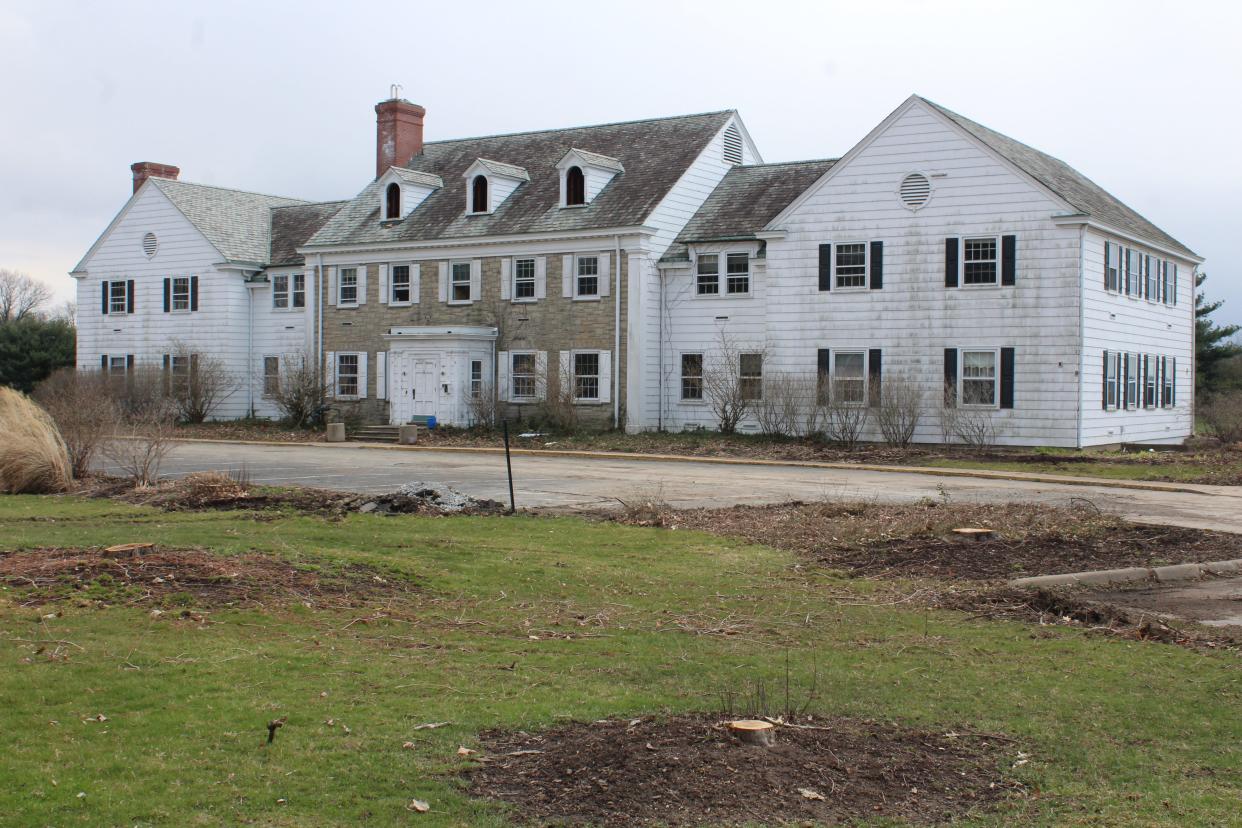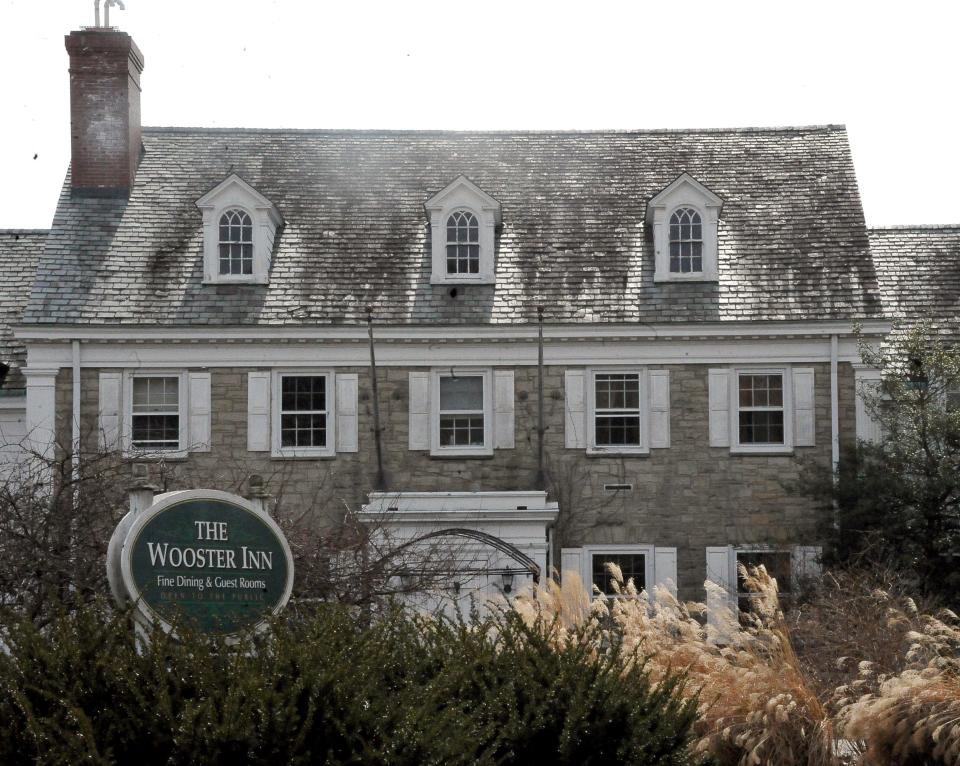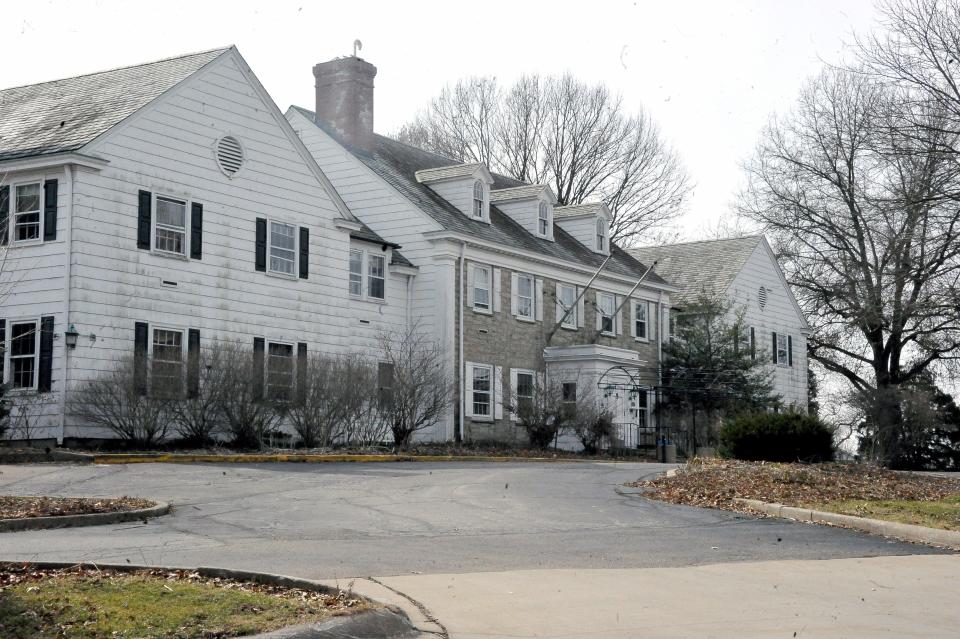The Wooster Inn is on its way out. Some residents hope to reverse the college's decision

WOOSTER – An empty lawn surrounds the Wooster Inn where 25 lumbering trees once stood.
They were cut down in early April. Only the posts that once held signs for the inn remain, but soon those, too, will come down along with the building itself.
For nearby residents who wish to see the Wooster Inn remain, the 11th hour is fast approaching.
Wooster Inn: College of Wooster to tear down iconic inn, built in 1958, next month
Crews are scheduled to demolish the 11,276 square-foot structure on Monday, April 18, according to the College of Wooster, which owns the property.
Wooster resident Martha Bollinger and nearly 30 other concerned citizens objected to the demolition at the April 7 planning commission meeting.
"I live directly across from the inn and it's so sad to see it slowly dying," Bollinger said at the public hearing. "I'm so disappointed."
With one week until the structure comes down, some residents hope to save the Wooster Inn before it's too late.
Historic preservation for a historic site?

Opened in 1958, the Wooster Inn is 64 years old. The building has witnessed a variety of events for both the College of Wooster and the community the institution serves.
With such a long history, Wendy Barlow, who once worked for the Ohio Historical Preservation Office, suggested the site become a historic landmark protected by the state.
Opinion: Letter: Wooster Inn is an important icon for the city and should be saved
"It meets all of the criteria," Barlow said at the planning commission meeting.
The building was donated by college Trustee Robert Wilson in honor of his father, a mathematics professor at the college from 1900 to 1907, according to a Wooster Voice article from 1957.
The finished architecture mirrored Wilson's home in White Plains, New York, and once opened, trustees stayed at the inn when traveling to Wooster.
To become a historic preservation site, the Wooster Inn would need to meet the criteria set by the National Register of Historic Places.
The register states that a site must be associated with or contributed to events in American history, be associated with a significant individual, embodies "distinctive characteristics" or yield important historical or pre-historical information.
Other criteria include: the site is over 50 years old or the property is commemorative in intent and has historical significance.
For the full list of criteria, visit the National Register of Historic Places website.
Barlow also argued that the College of Wooster was placed in a landmark historic district in the late 1900s for its historical significance, and the Wooster Inn should follow suit.
Any changes to signage, exteriors and the site, demolition and new building construction in this district must be approved by the Review and Design Board, according to the city of Wooster.
While such a district wouldn't protect the inn, Barlow said, it would give it official historic recognition from the city.
"It's a tragedy when you start removing the town from the gown," she said. "It's a place where the community and college met."
What will replace the Wooster Inn?

Once torn down, the college plans to build 12 tennis courts on the property zoned as conditional use for recreational purposes, according to preliminary development plans approved by the Wooster Planning Commission.
A 73-spot parking lot will be constructed with two entrances for traffic, said Douglas Drushal, an attorney in Wooster who presented the development plan.
"These courts will be slightly larger" than what is on Beall Avenue, Drushal said at the planning commission meeting. This will pave the way for potential long-term projects that could see the existing tennis courts replaced with another structure.
If completed, the new recreational property will have minimum lighting surrounding the tennis courts for walkers and at a nearby restroom.
Drushal said the facilities will be for daytime use only, and no lights will be installed on the tennis courts.
Providing a small buffer from East Wayne Avenue and the nearby neighborhood, the facility will be set back 35 feet, he said.
Windscreens on the north and south sides will provide a sense of privacy, obstructing the view from the tennis courts to the houses across the street.
Why is the Wooster Inn coming down?
Drushal emphasized that the proposed 12 tennis courts are not causing the demolition.
The high cost of reopening the Wooster Inn and the inability to hire management able to meet the financial obligations are the primary reasons the structure is coming down, spokespersons for the College of Wooster have told The Daily Record.
Repairs were estimated at over $4 million based on pre-pandemic prices and did not include cosmetic renovations.
The "significant capital improvements required to operate the Inn" were weighed by the trustees against other infrastructure priorities such as "much-needed investments" in student housing, Melissa Anderson, the college's chief communications and marketing officer, told The Daily Record.
Trustees couldn't justify the expense of taking on the project in light of other pressing needs on campus, according to board Chair Sally Staley.
With the preliminary development plan approved, developers will return to the drawing board to produce a final development plan, which will return to the planning commission for approval.
Reach Bryce by email at bbuyakie@gannett.com
On Twitter: @Bryce_Buyakie
This article originally appeared on The Daily Record: As demolition date looms, residents object to Wooster Inn replacement

